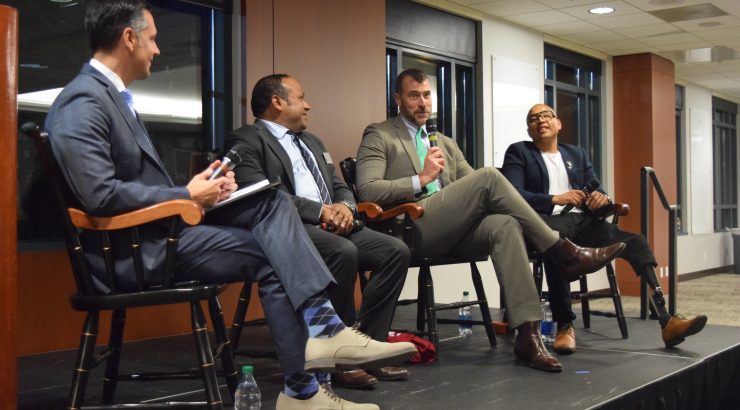
A Conversation About the Human Costs of War The Psychological and Emotional Impact of Going to War and Coming Home
October 30, 2019
A veteran, a historian, and a therapist visited Chapman’s campus…and engaged in an enlightening, pertinent, and productive conversation about the human costs of war. Moderated by Dr. Gregory Daddis, the director of Chapman’s MA in War and Society program, Afghanistan War veteran Josue Barron, Dr. David Kieran, and Dr. Naveen Jonathan discussed the psychological and emotional impact of going to war and coming home during an era of persistent conflict.
The Iraq and Afghanistan Wars are the longest conflicts in US history, and the first to rely on an all-volunteer military. As a result, soldiers and marines typically serve multiple overseas deployments, an issue the US military had never confronted before and one that has new, unique mental health consequences. Dr. Kieran, a professor at Washington and Jefferson College, noted that the military was well-equipped to treat acute stress, but not its long-range effects, in part because not much research had been done on post-traumatic stress disorder (PTSD) when the wars first started. Chapman’s Chair of the Department of Marriage & Family Therapy, Dr. Jonathan, added that PTSD has always existed, but its recognition, treatment, and classification in the Diagnostic and Statistical Manual of Mental Disorders (DSM) are all relatively recent. PTSD began to gain attention in the 1960s, entered the DSM in the 1980s, but was classified as an anxiety disorder, and wasn’t given its own category until 2013. All the panelists noted the difference between physical wounds from war and “invisible wounds,” as marine veteran Barron described to them. He spoke about how, as an amputee, it was easier in some ways to cope with his injuries and begin the process of recovery. The psychological costs of war are not immediately apparent and are more difficult to treat, they can develop over time and PTSD manifests differently in everyone.
The men also discussed soldiers’ families, whom might not fight but are enveloped in war’s “widening circle of psychological damage,” as Dr. Kieran put it. Just as soldiers must prepare for deployment and adjust to returning home, so must their families. Barron noted that his wife’s support was an integral part of his recovery, but he recognized that she needed her own support system too. According to Dr. Jonathan, those close to veterans can experience “vicarious trauma” or “secondary trauma,” and he advocated that families should be involved in pre- and post-deployment counseling.
Ultimately the conversation revealed the importance of having more conversations regarding mental health, in the military and in society in general. Dr. Jonathan pointed out that our society tends to prioritize physical health over mental health, which is still stigmatized. In the military context, the stigma is compounded by an emphasis on valor and courage. Moments of intense bravery, however, are also psychologically scarring, Dr. Kieran emphasized, and he says society must recognize that. The best way to destigmatize mental health, according to the panelists? Talking about it.
Dr. Daddis’ final question asked the panelists to voice the most important thing they wanted to leave the audience with. Barron emphasized that he wishes that people would ask about his prosthetic limb and his military service, rather than just stare. The need to engage, to bridge the gap between those that serve and those who do not, and to not be afraid of uncomfortable questions and difficult conversations, is an ongoing process, as it should be as we continue to be fight protracted wars. We will continue to have these conversations in Chapman’s War and Society program, and we hope you join us.

